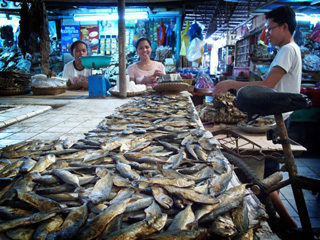
烟业智汇

零售户在线

微薰

手机版
烟草在线据法新社报道编译

2010年,菲律宾一名女子在塔比拉兰的一家市场卖鱼。

去年,马尼拉的公共汽车终点站发现了一个禁止吸烟标识。
菲律宾政府烟草部门的一名官员说,菲律宾发起了一项推动烟草的新活动——不是推动用于吸烟的烟草,而是用于鱼类养殖。
菲律宾国家烟草管理局的Rex Teoxon说,6个月后,北部滨海省份拉乌尼翁的大约400名渔民将利用“烟尘”杀死捕食鱼类的软体动物和其他食肉动物。
菲律宾国家烟草管理局企业企划部的领导人Teoxon说:“我们准备就利用烟尘的可持续发展水文化,对渔民和整个社区进行培训。”
这项举措是面对全球反吸烟活动的浪潮,寻找烟草的替代性用途的行动的组成部分。
Teoxon说,由粉碎和加工后的废烟叶做成的烟尘,是渔民们一直使用,但“已经被禁止很久的高毒性化学物质”的安全替代品。
他说,测试发现,由于活性成分尼古丁在两三天内就会蒸发掉,因此,烟尘能杀死食肉动物,但对渔场里养殖的鱼类不会产生影响。
此外,他补充说,它有助于给水域施肥,促进养殖鱼类所食用的水藻的生长。
这位烟草管理局的官员说,烟尘还可以免费提供给渔民,但如果被证明有效的话,还可以对它进行商业化营销。
过去,菲律宾国家烟草管理局对使用烟种作为人类食物和动物食物进行了试验,它还推动将烟梗用于造纸和颗粒板。
尽管菲律宾政府对吸烟和卷烟广告实施了严格的控制,但烟草业在经济和成千上万人的生计方面仍然起着重要的作用。
Teoxon说,政府的一项调查发现,在2010年,多达290万人依靠烟草业为生,其中包括68万农民和他们的家庭成员。
Philippines pushes tobacco - for fish farming
AFP
A woman sells fish in a market in 2010 in Tagbilaran in the Philippines.
A no smoking sign is seen at a bus terminal in Manila last year.
The Philippines has launched a new campaign promoting tobacco -- not for smoking but for fish farming, a government tobacco agency official said Thursday.
Over six months, about 400 fish-farmers in the northern coastal province of La Union will be using "tobacco dust" to kill mollusks and other predators that prey on fish, said Rex Teoxon of the National Tobacco Administration.
"We are going to train the fisher folk and the whole community on sustainable aqua culture using the tobacco dust," said Teoxon, head of the agency's corporate planning department.
The drive is part of an effort to find alternative uses for the crop in the face of the global anti-smoking campaign.
The dust, made of pulverised and processed waste tobacco leaves, is a safer alternative to the "long-banned, highly-toxic chemicals" that the fish farmers have been using, Teoxon said.
Tests have found the tobacco dust kills the predators but does not affect the fish raised in the farms, with the active ingredient nicotine evaporating in two to three days, he said.
Additionally, it helps fertilise the waters, promoting the growth of algae that the farmed fish feed upon, he added.
The tobacco dust will be provided free to the fish-farmers but if proved to be effective, it will be marketed commercially, said the tobacco official.
In the past, the agency has experimented with using tobacco seeds for human and animal food and it still promotes the use of tobacco stalks for paper and particle boards.
Although the Philippine government has imposed strict controls on smoking and cigarette advertising, the tobacco industry still plays a huge part in the economy and the livelihood of thousands.
Teoxon said that a government survey found that in 2010, as many as 2.9 million people were dependent on the tobacco industry including 680,000 farmers and their family members.

重庆中烟,以新质生产力推动企业高质量发展